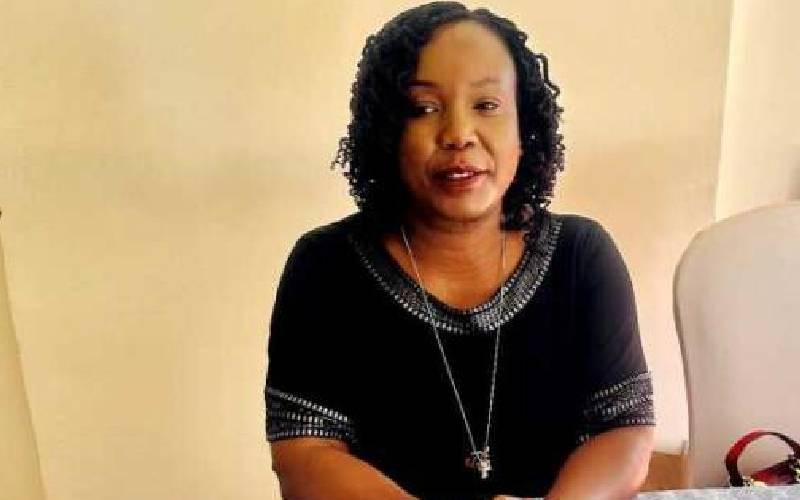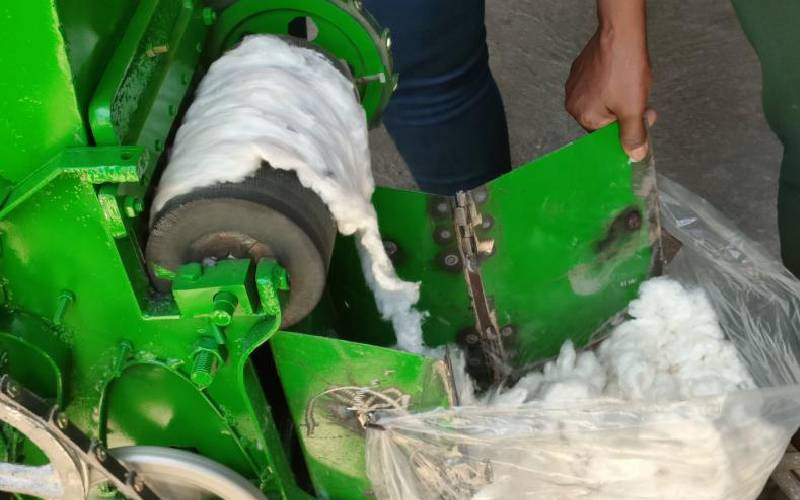By Cyrus Ombati and Vitalis Kimutai
Police now say the object a plumber found next to basement entrance to Prime Minister Raila Odinga’s office, forcing police evacuations from the expensively refurbished building, was not lethal.
To quash fears someone could have been after the PM’s life, Police Commissioner Mathew Iteere’s spokesman addressed a news conference last evening with the device — that was not shown journalists — sitting in a brown envelope on his table.
 |
Police officers outside Prime Minister Raila Odinga’s office on Harambee Avenue, Nairobi, where a grenade was found on Tuesday. Photo: Vitalis Kimutai/Standard |
A source at the PM’s office revealed it is police from Vigilance House down the street who drew the attention of Raila and the occupants of the building to the discovery of the device and who asked them to leave for their own safety as bomb experts were called in.
“They found it at the entrance of what used to be Home Park Restaurant, above which sits the PM’s office,’’ explained the source on grounds of confidentiality because the matter was then in the hands of the police.
He added: “The grenade was buried in rubble gathered there in the ongoing construction.”
The PM’s office is opposite President’s and the Attorney General’s offices, and not too far off from the Ministry of Foreign Affairs headquarters and two buildings at outstanding on Nairobi’s skyline —Times Towers and Kenyatta International Conference Centre.
Deputy Police Spokesman, Mr Charles Owino was emphatic the object was harmless as it had been neutered by earlier use; a fact he said was obvious from examination by explosive experts. He gave the grenade model as Urges 85.
Used grenade
“The used handheld grenade had been lying at the scene for sometime before being discovered and it posed no threat to life or property,’’ Owino told journalists.
In a bid to further calm the country and stop speculation, Owino claimed the grenade was the model usually used during paramilitary training, and explained it was not lethal like the one used in conventional warfare.
The police assurances would, however, not answer the question as to who may have planted the device, described by Owino as a grenade without the trigger mechanism commonly called the safety pin, at the vantage position in the high-security facility. Speculation was also rife on why police did not display the grenade to journalists once it had been certified harmless.
But it emerged from unofficial police sources that despite Owino’s public statement, behind the scenes police officers were under instructions to get to the bottom of the bomb scare that forced the evacuation of the PM and his guest, Chief Justice Willy Mutunga.
On social websites Kenyans speculated on the bomb scare with some claiming it could have been a stunt meant to divert attention from the beginning of the confirmation of charges hearings at the International Criminal Court featuring Deputy Prime Minister Uhuru Kenyatta, Head of Civil Service Mr Francis Kirimi Muthaura and former Commissioner of Police Maj-Gen (rtd) Hussein Ali. But many Kenyans wanted to be sure the PM was safe and independent investigations to establish the source of the grenade, used or unused.
However, given that last year Kenyans witnessed bloodshed from grenade explosions during a prayer service at Uhuru Park, and on a Kampala-bound bus in Nairobi, The Standard established the police were taking the discovery more seriously than it is letting the public know.
One security officer independently told The Standard that whether the device had been used or not, the person who placed it there must be either an insider or someone trained on how handling bombs. “Whether it was a real or fake bomb, the person who left it at the compound must be a knowledgeable person. It boils down to the security officers themselves,” said one senior officer versed with similar explosives.
At his briefing, Owino also confirmed that the building housing the PM’s offices were swept by bomb experts using sniffer dogs and confirmed that it was fit safe for occupation, as there was no threat to staff and members of the public. He also assured the security of the PM had not been compromised.
Courtesy call
Raila was at the time meeting Mutunga who had paid him a courtesy call, and in his office was his Permanent Secretary Dr Mohammed Isahakia. It was Mutunga’s first visit to Raila’s office since his appointment.
Security officers kept the PM and his guest posted until they felt it was safe for them to leave as there was no fire and the lifts were out of harm’s way. The CJ left first before Raila and Isahakia took the VIP lift to the parking.
“The PM’s exit was calmly executed to avoid causing a panic before an alert to vacate the building was issued,” explained an aide to the PM who was under orders not to speak to the media until investigations were complete.
The PM caught many of his aides unawares as he was supposed to be taking a break to go and condole the family of former Ugenya MP Archbishop Stephen Ondiek who died last week. By the time Raila was leaving the building, his security had lined-up his motorcade for the trip to Ondiek’s home in Gigiri.
It was only at the basement parking that Raila mentioned to some of his other aides that the building was being evacuated.
“We did not want to create a panic or a stampede. The rest of the staff were ordered to vacate their offices as security were called in action,” said our source. PM’s office was tight-lipped insisting it was a security matter being handled by the police. His spokesman, Mr Dennis Onyango said: “It is in the hands of security officers and the police will issue a comprehensive statement. We do not want to speculate.”
Explosive
It is reported the meeting with Mutunga at the former Shell and BP House had not formally started when the call to vacate reached the host. It is also believed the two were to discuss implementation of the Constitution and pitfalls that have undermined the process.
Police cordoned off the building, using dogs to keep at bay the curious crowd that gathered near the scene and the operation ended after about three hours.
The basement of the building is rarely used, officials familiar with operations at the building revealed.
It was not clear how the explosive found its way to the office, classified as strategic and under a 24-hour security surveillance, including CCTV cameras, and police watch.
A plumber who had been working at the building is said to have stumbled upon the explosive before he called security officers. The officers then called their superiors and those from the Bomb Disposal Unit.
Those at the scene included Deputy Commissioner of Police Mr Francis Okonya, Director of Criminal Investigations Mr Ndegwa Muhoro and Director of Police Operations Mr Julius Ndegwa. They all went to where the explosive lay before it was carted away by bomb experts in a sack. Iteere was in North Eastern Province for a security meeting at the time.
 The Standard Group Plc is a multi-media organization with investments in media
platforms spanning newspaper print operations, television, radio broadcasting,
digital and online services. The Standard Group is recognized as a leading
multi-media house in Kenya with a key influence in matters of national and
international interest.
The Standard Group Plc is a multi-media organization with investments in media
platforms spanning newspaper print operations, television, radio broadcasting,
digital and online services. The Standard Group is recognized as a leading
multi-media house in Kenya with a key influence in matters of national and
international interest.
 The Standard Group Plc is a multi-media organization with investments in media
platforms spanning newspaper print operations, television, radio broadcasting,
digital and online services. The Standard Group is recognized as a leading
multi-media house in Kenya with a key influence in matters of national and
international interest.
The Standard Group Plc is a multi-media organization with investments in media
platforms spanning newspaper print operations, television, radio broadcasting,
digital and online services. The Standard Group is recognized as a leading
multi-media house in Kenya with a key influence in matters of national and
international interest.










